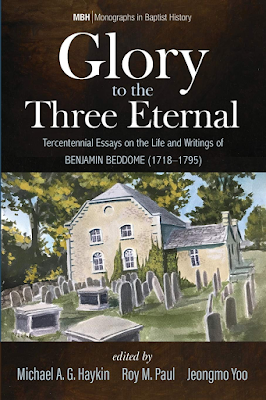Glory to the Three Eternal: Tercentennial Essays on the Life and Writings of Benjamin Beddome (1718-1795) (Monographs in Baptist History, Volume 13)
Pickwick Publications, 2019
182pp., paperback, £21.00 / $25.00
In the eighteenth century several hundred people were attracted to the Cotswold village of Bourton from the surrounding countryside to hear the faithful preaching of Benjamin Beddome. He was the Baptist pastor in the village for fifty-five years until his death in 1795. Early on in his ministry in 1741 there was a spiritual awakening. By 1766 over two hundred had been baptised and added to
the church.
Beddome was a faithful man who stood firmly in the Puritan and Particular Baptist tradition established by his forefathers. Gary Brady says of him, ‘while never a giant of Particular Baptist history he was certainly a shining light.’ This slim volume containing six essays by six different authors will go a long way toward remedying his relative obscurity. They form the first critical study of Beddome’s writings.
Following a biographical sketch, we have three essays that deal with his convictions regarding the Trinity, the person and work of Christ, and the Holy Spirit. the remaining two essays focus on his hymns and his answers to ‘the Modern Question’ (concerning the free offer of the gospel and whether it is the duty of sinners to repent and believe). It is clear that Beddome was no hyper-Calvinist. There is some repetition in these essays, mostly of a biographical nature - almost inevitable when there are six different authors. Beddome is best remembered today for his hymns, used widely by contemporaries, but not published in their entirety until over twenty years after his death. One of his best known hymns runs:
God in the gospel of his Son,
Makes his eternal counsels known;
’Tis here his richest mercy shines,
And truth is drawn in fairest lines.
Another of his legacies is A Scriptural Catechism (reprinted in 2006). Beddome had been a student in Bristol Baptist Academy, and the use of his catechism there helped the Academy to maintain its Calvinistic theology during the eighteenth century and the first decades of the nineteenth century.
This volume has been a long time coming, but I hope that readers will conclude that it was worth the wait. It deserves a wide readership and is warmly commended.
AUSTIN WALKER
